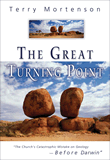
But from the Beginning of . . . the Institution of Marriage?
In 2004, respected Christian apologists Dr. John Ankerberg and Dr. Norman Geisler have launched another attack on young-earth creationism.
Respected Christian apologists Dr. John Ankerberg1 and Dr. Norman Geisler2 launched another attack on young-earth creationism, this time by objecting in a web article to the frequent YEC use of Mark 10:6, from which we argue that Jesus was a young-earth creationist and so we should be too, if we call Him our Lord.
Ironically in a little 1991 booklet on evolution,3 Ankerberg and co-author John Weldon mention Matthew 19:4–5 (the parallel passage to Mark 10:6) as part of their defense of the young-earth view. They even state that they have studied the various old-earth reinterpretations of Genesis “in detail and believe they all have fatal biblical flaws.” It is tragic that Ankerberg has since ignored Jesus’ teaching and his own reasoning based on it (or perhaps they were Weldon’s arguments and Ankerberg only helped write other parts of the booklet).
In any case, it is clear from Ankerberg’s comments when moderating the Hovind-Ross debate (with an unfair old-earth bias) that he picked up many compromise views at his seminary. And as shown by Dr. David Menton’s letter to Ankerberg in June 1992, Ankerberg was clearly an old-earther at about the time of the booklet. This letter shows the disrespectful way Ankerberg treated high-profile young-earth creationist Ph.D. scientists, who had given up much time to record programs for him, and instead he substituted the gross errors of old-earther Hugh Ross.
But consider now Ankerberg’s and Geisler’s current handling of Mark 10:6 in their web article. In response to a question from the Pharisees about divorce Jesus replied in that verse, “But from the beginning of creation, God made them male and female.”
In their article “Differing Views of the ‘Days’ of Genesis” Ankerberg and Geisler (A/G) first state the YEC reasoning on Mark 10:6 and then give their objections to that view.4
VIII. Mark 10:6 Affirms That Adam and Eve Were Created at the Beginning
Argument: According to this text, “At the beginning of creation God ‘made them male and female.’” If God created humankind at the beginning of Creation, then they were not created at the end of millions of years, as the old-earth view contends.
Response: First, Adam was not created at the beginning but at the end of the creation period (on the sixth day), no matter how long or short the days were. Second, the Greek word for “create” (ktisis) can and sometimes does mean “institution” or “ordinance” (cf. 1 Peter 2:13). Since Jesus is speaking of the institution of marriage in Mark 10:6, it could mean “from the beginning of the institution of marriage.” Third, and finally, even if Mark 10:6 is speaking of the original creation events, it does not mean there could not have been a long period of time involved in those creative events.
Below I first restate their argument point by point, which is indented, and then offer my refutation of each point.
A/G response 1: First, Adam was not created at the beginning but at the end of the creation period (on the sixth day), no matter how long or short the days were.
Notice that they have slipped in the word “period.” But Jesus didn’t say Adam and Eve were created at the beginning of the “creation period” (i.e., the beginning of Creation Week). He said at the “beginning of creation.” He is talking about the whole creation from Jesus’ day back to the very first moment of creation, just as Paul is referring to the whole creation during all of history in Romans 1:18-20 and Romans 8:19-23. In other words, Jesus is saying that Adam and Eve were created at the beginning of history.
This is seen also in the parallel passage to Mark 10:6 found in Matthew 19:4, where Jesus says that Adam and Eve were simply “at the beginning.” Jesus uses the exact same Greek words (translated as “from the beginning of the creation”) in Mark 13:19 and in the verse is clearly speaking of all time from the first day of creation to his day. Compare also his reference to the similar phrase “from the foundation of the world” in Luke 11:50-51. By adding one word (“period”) Ankerberg and Geisler have put a certain spin on what their Lord said and therefore misinterpreted Him. So, this objection to the YEC argument from this verse fails.
A/G response 2: Second, the Greek word for “create” (ktisis) can and sometimes does mean “institution” or “ordinance” (cf. 1 Peter 2:13). Since Jesus is speaking of the institution of marriage in Mark 10:6, it could mean “from the beginning of the institution of marriage.”
They argue that ktisis (which is actually the noun “creation” not the verb “create,” as A/G say) in Mark 10:6 should be translated as “institution” so that Jesus should be understood to be talking about the beginning of the institution of marriage, not the beginning of creation. They base this interpretation on the fact that in 1 Peter 2:13 ktisis is translated in the NIV as “to every human authority” or in the NASB as “to every human institution.” But they have not paid careful attention to the presence of “human” in this verse.
The Greek text is clear. The phrase under question is pasē anthrōpinē ktisei, where the whole phrase is in the dative case (so literally “to every human creation”) and the adjective anthrōpinē (“human”) modifies ktisei (“creation”). An institutional authority (such as kings, governors and slave masters, which Peter discusses in the context) is indeed a “human creation.” But this is a very different contextual use of ktisis than we find in Mark 10:6, where no adjective is used to modify “creation.” Furthermore, in Mark 10:6 Jesus could have easily said “from the first marriage” or “from the beginning of marriage” or “since God created man” or “since God created Adam,” if that is what He meant.

Finally, if we give ktisis in Mark 10:6 the meaning “authority” or “institution,” it makes no sense. What does from the beginning of authority or beginning of institution mean? To make it meaningful Ankerberg and Geisler would have to add a word to the text, which would have no contextual justification.
Jesus is reaching farther back in history for the basis of his teaching on marriage. The Pharisees go back to the time of Moses’ writings in Deuteronomy, whereas Jesus goes back to the beginning of time. Jesus spoke these words about 4000 years after the beginning. If we equate those 4000 years with a 24-hour day, then Jesus was speaking at 24:00 and the creation of Adam and Eve on the sixth literal day of history would be equivalent to 00:00:00:35 (half a second after the beginning), in the non-technical language of Jesus here is the beginning of time. So, Jesus is indeed saying that Adam and Eve were at the beginning of creation.
A/G response 3: Third, and finally, even if Mark 10:6 is speaking of the original creation events, it does not mean there could not have been a long period of time involved in those creative events.
This is very odd reasoning from two men who usually in their writings and speaking display such excellent logic. If Jesus is saying that Adam and Eve were at the beginning of creation, as He clearly was, then it should be patently obvious that there can be no long period of time (billions of years are what Ankerberg and Geisler want to fit in to Genesis 1) before Adam and Eve. If the universe is truly about 15 billion years old as the evolutionists insist (and these two Christian leaders accept) and if the first true man and woman evolved into existence only about 100–200 thousand years ago (as evolutionists contend, or if Adam and Eve were supernaturally created only a few tens of thousands of years ago, as Ankerberg and Geisler probably believe) then Adam and Eve would not be at the “beginning of creation” but at the tail end of the creation to-date! If true, Jesus could hardly be more mistaken.
So Mark 10:6 (along with other statements of Jesus in the gospels) clearly shows that Jesus took Genesis as literal history and was a young-earth creationist. (A longer in-depth defense of this conclusion can be found here.) And since Drs. Ankerberg and Geisler call Him “Lord” they should repent of their old-earth teachings and join YECs in calling the church back to the authority of the Word of God beginning from the very first verse, so that with greater credibility the church can proclaim the gospel and the moral standards of Scripture to a rebellious and lost “evolutionized” world.
The rest of the Ankerberg/Geisler article could be similarly refuted, but that would make this article too long. Most of their arguments (which are not unique to them) are handled in Jonathan Sarfati’s Refuting Compromise. Though it is primarily a thorough and insightful exposé of the many serious errors in the teachings of Hugh Ross, which both Ankerberg and Geisler have endorsed, it also refutes other old-earth arguments. And to see that the idea of millions of years (which is clearly driving Ankerberg’s and Geisler’s reinterpretations of Mark 10:6 and Genesis) did not come from the rocks and fossils but from anti-biblical philosophical/religious presuppositions applied to the rocks and fossils, see my book, The Great Turning Point. These two books are must-reading for every seminary professor, pastor and other Christian leaders.
Footnotes
- Ankerberg is the producer and host of the influential Christian TV program, The John Ankerberg Show. He has also written many helpful books.
- Geisler is a prominent philosopher, former president of the Evangelical Theological Society, current president of Southern Evangelical Seminary and author of an amazing number of useful books.
- See John Ankerberg and John Weldon, The Facts on Creation vs. Evolution, Harvest House, Eugene, OR, p. 43, 1991.
- Jeff Weldon, “Differing Views of the ‘Days’ of Genesis,” The John Ankerberg Show, 2004, https://www.jashow.org/articles/science/age-of-earth/differing-views-of-the-days-of-genesis/.
Recommended Resources

Answers in Genesis is an apologetics ministry, dedicated to helping Christians defend their faith and proclaim the good news of Jesus Christ.
- Customer Service 800.778.3390
- Available Monday–Friday | 9 AM–5 PM ET
- © 2026 Answers in Genesis






